'Rough' (1983)
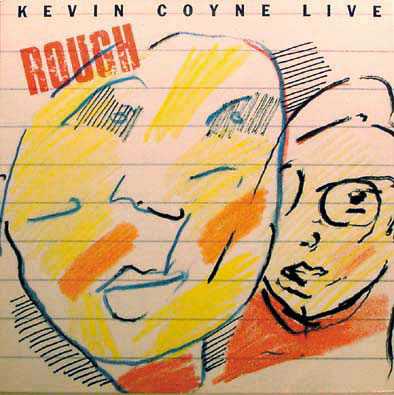
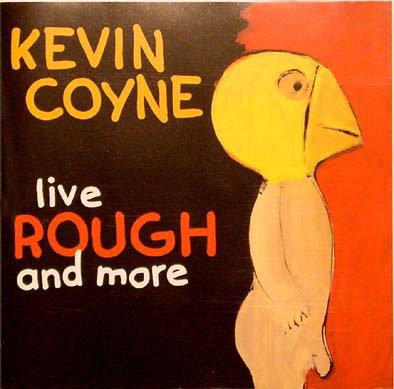
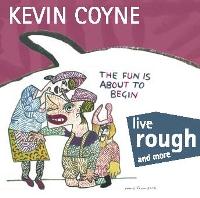 (Artwork: Original LP and 2 CD reissues)
(Artwork: Original LP and 2 CD reissues)

A
fantastic band (Peter Kirtley, guitar, Dave Sheen, drums, Steve Lamb, bass,
just before the break-up and breakdown. Coyne was about to collapse under the
weight of divorce, alcoholism and depression. He'd move to Germany with some
desperate years ahead. His fans would hear nothing of him and would file him
accordingly – in the forgotten section.
The sound of 'Rough' is powerful, with Kirtley's guitar
and his inspired solos, and rhythmically perfect: Lamb is a virtuoso of the
fretless bass.
Coyne revisits 'House On The Hill' and 'Pretty Park' in
forceful and lyrical style, and lets rip with 'Monkey Man', and a mutilated
version of 'Lucille'. Disappointingly short as an LP but the '90s CD reissue
restored several unreleased numbers.
By the same band (with the exception of Dave Wilson on
drums), check the only (official) DVD to date: 'Kevin Coyne at the Last Wall',
recorded live in Berlin in 1982.
"This live album recorded in Bremen, Germany in 1985 features one of Kevin Coyne's best ever bands in scintillating form. The spirit and power comes from intensive touring round Europe, from a group used to improvising together. Listen to Steve Lamb's jazzy fretless bass and Peter Kirtley's bluesy, rock infused guitar playing. For the artist, it mirrors almost perfectly the angst and humour contained in the lyrics. Classic Coyne efforts like 'House on the Hill' and 'Saviour' never sounded better.
The addition of the single 'Happy Holiday' is a genuine bonus too, featuring Coyne in a heartfelt commercial mood." (Reissue press release)
Robert Coyne: "As good as the music is, the moments of 'The Last Wall' I most enjoyed seeing again after more than twenty years were not part of the concert itself, but two staged scenes at the beginning and the end of the film. In the first scene, the band 'arrive' at the concert site, and Dad leads everyone from the van (that it's marked 'Valiant Electrical Wholesale Company, Lettice Street, Fulham' adds a tragi-comic note – no Rock Star trappings for Dad, ever) with mock gravitas: 'Follow me... take your time... it's a very important show...'. In the second scene, at the conclusion of the gig, Dad tears through the paper wall at the back of the stage and steps outside to contemplate the real Berlin wall beyond it. It's an effective piece of theatre, and I know Dad would have appreciated the drama and the symbolism of it, but I'm quite sure that as he turns around he's struggling not to laugh." (2008)
'The Monkey Man' at The Last Wall
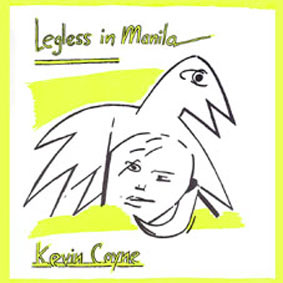
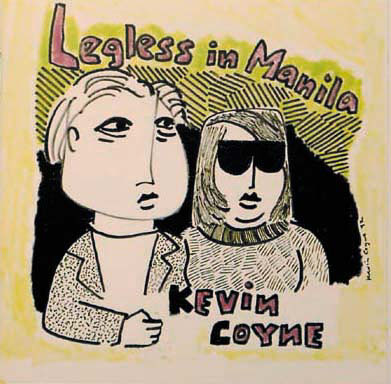 'Legless In Manilla' (1984)
'Legless In Manilla' (1984)
![]()
Released on his own label ('Collapse', which duly collapsed immediately), 'Legless In Manilla' is a superb if rather forgotten album.
The absence of a guitar soloist (Coyne and Kirtley no longer getting on... how many musicians did Coyne exhaust in this way?) makes it one of the bluesiest Kevin Coyne albums. 'Big Money Man' and 'Money Machine', are almost solo Coyne. The album's big moment is the superb hypnotic lament of 'Gina's Song'.The blues are well balanced by the good old improvised ravings of 'Zoo Wars' or 'Raindrops On The River'.
Kevin Coyne: "I did once have my own label – I did very briefly – it was called 'Collapse-Records'. We made one record and then it collapsed! (laughs) It is true! But I was not very serious about it. It was distributed by Rough Trade. It is a lot of hustle to run your own label." (Jazz Dimensions, 2001)
"I did 'Legless in Manilla' on my own label. We did it very quick. I was economizing like mad. I wanted to do something very sort of naked. Peter Kirtley was supposed to be on the album but he was doing something else with somebody else and I sort of just carried on without him. It was a bit of a shambolic session" (1994 interview, from 'Beautiful Extremes, Conversations with Kevin Coyne')
'Peel Sessions' (1973/1990)
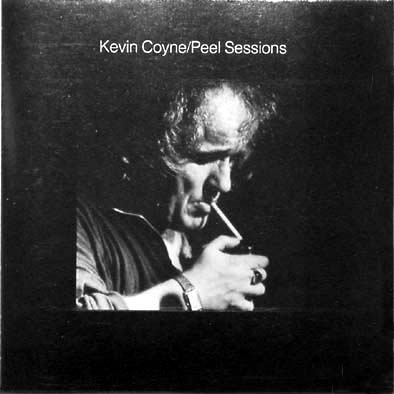
![]()
Attention, masterpiece! John Peel was always a fan, first signing Coyne to Dandelion records, then continuing to invite him regularly to BBC sessions. Coyne often brought along new songs, unreleased versions or improvisations.
This collection is superb (but very incomplete – there is enough quality material in the archives to fill 4 CD's). This album covers the 'Marjory' and 'Matching' line-ups (the improbable and clownish 'Dance Of The Bourgeoisie'), through to Bob Ward let loose on electric guitar ('That's Rock'n'Roll', a homage to punk to take your breath away), by way of poignant ballads often invented on the spot ('Do Not Shout At Me Father' or the harrowing 'Rivers Of Blood').
Coyne shows himself, for those who missed him on stage, as an incredible performer. The lucky ones who saw him know that age and illness never diminished his stage presence.
Kevin Coyne: "I've done almost more [BBC] sessions than anyone else! There's a lot of material in the archives. [╔] I used to just do it in the [radio] studio. Just 'live', one-off things. I used to do it especially for John Peel really, because I thought you had to use the radio. And I don't see any point in fucking going in and duplicating a record. I wanted to use that supposedly live ambiance of the studio. Well, you know it's pre-recorded but use the chance to do some extra recordings. I mean, Peel's been a good mate of mine over the years and normally he goes along with what I throw in." (1997 interview, from 'Beautiful Extremes, Conversations with Kevin Coyne')
John Peel: "It's perfectly possible that the tapes for these no longer exist anyway. The BBC's attitude at the time was that something like 'Gardener's Question Time' should be preserved for eternity, you know, in a special lead-lined box at the bottom of a mine-shaft in the home counties. But things like pop music were so disposable that, well, they disposed of it! So a lot of it is gone." (1997 interview, from 'Beautiful Extremes, Conversations with Kevin Coyne')
"He was a horrendously under appreciated poet/folkie/jazzer/ bluesman, long on soul and a Van Morrison-like spirit and passion in his gruff and gravelly voice. Notably, he was one of the few British artists (or from anyplace besides the rural South U.S. for that matter) who could take the blues and truly make it his own, writing shouts and hollers about decidedly local (and painfully relevant) subject matter – mental illness, coal miners ('The Miner's Song') and how the system conspires to grind ideas and people down ('Ey Up Me Duck'). And just hearing him make the transition on tape from lean, turtlenecked Nick Drake/Richard Thompson folkie-type into gruff, grizzled and wearied pub singer is itself almost as unsettling as the topics of his songs. Riveting stuff, indeed." (cmj.com, 2000)
'Do not shout at me Father'
 Germany (1984-2004)
Germany (1984-2004)
Kevin Coyne: "╔four or five litres of wine a day." (The Independent, October 27, 1988)
Helmi Coyne: "I visited my brother who lived in a very strange community and they had the name 'Kevin Coyne' on the letter box. I said: 'Now, you've gone completely mad, you write 'Kevin Coyne' on the letter box' and he said 'Well, he's living here' and I couldn't believe it." ('Loladamusica', 2001)
Kevin Coyne: "╔break-up of a marriage╔ I was in a very bad state, drinking heavily. I think I went to Munich to sample the beer as much as anything else. But I don't drink now!" (Melody Maker, Mar 3 1990)
Helmi Coyne: "He had been living in Nčrnberg [for some time] and the way I came up first was he lived in a kind of communal flat with my brother. He was sharing a flat with him and two other women. [╔] He was at his lowest point. He was very ill, drinking, no carrer and in a very bad situation. [╔] Kevin had left London; first he was staying with a friend in Munich then he came to Nčrnberg where he was offered a place to stay with this other woman. And it was really never planned that he would stay for good. He had a son with this woman. Then the situation got worse because he never really planned to have another family, he was feeling so bad, he was in such a terrible situation himself that this kind of new relationship and then a son╔ it didn't work out in any way. And this is when I met him, because he was struggling with this woman and she had left him, and he tried to look after the child, but it didn't work out so it was all a very complex, complicated, very sad situation." (interview with Pascal Regis, 29 Sep 2011)
Kevin Coyne: "I am an alcoholic, so I can speak with some authority.
I haven't had a drink in three and a half years now, but I have to say it
played a considerable part in my demise. I never bothered with the other drugs.
I thought I was rather immune just being a drinker, but of course it's just as
deadly. I tend to believe alcoholics are born and not made. Medical evidence
show it's a physical weakness coupled with a mental obsession.
My best work was always done with either little or no
alcohol. Since I stopped drinking I've been enormously productive. I have to
say in my travels through the music business that it's as widespread there as
in any other profession. An alcoholic is an alcoholic, whether he's a bank
manager or an Eskimo. It's really as extreme as that." (1990?)
Helmi Coyne: "He was drinking and he had no money and then he was on his own in this other place, and he couldn't pay the rent, the telephone was cut off and he was really at the end of his life, he was in a terrible shape, shaking a lot. It was awful to see and when I met him I just tried to be very practical and help him to get things sorted out, like, getting the telephone back and paying the rent and looking after him. It was not a love affair by any means. It was just that I saw that he was in such a terrible state that I thought: "How can I let this great artist finish up in a place like this?" [╔] He was so alone and everybody had given up. My personal feeling was nobody really gave a shit. I did not know much of his music, I had heard his music a couple of years before when I was in Mexico with a friend, and then I met him in person when he lived with my brother. They were all drinking heavily and it was a scene I did not mix with at all." (interview with Pascal Regis, 29 Sep 2011)
Kevin Coyne: "The two notable things to ever come out of the United States are rock'n'roll and Alcoholics Anonymous. I would say it saved my life, or saved my sanity. And, of course, rock'n'roll╔ it was a great import╔ and a great invention." (Charleston Gazette, 2000)
Helmi Coyne: "He was living in a squat. He was permanently drunk. He couldn't eat. I'd see him at Nuremberg railway station. He never asked for money, but I'd give him 20 marks – I knew he had nothing. Everyone believed he was going to die." (Interview by Robert Chalmers, 2004)
"So I just tried to help him and look after him. And then he tried to stop drinking, he failed and then he tried again half a year later and it worked. In Fčrth, which is the town next to Nčrnberg, there was an English speaking AA group, because in those days the American Army was stationed there. Twice a week I would give him a lift to Fčrth, he was attending, I was waiting in the car to pick him up again and drive him back. That was really hard work. But it worked and he really stopped for good. The first year was extremely difficult because he was so incredibly restless. He could not stay in, so every night we had to go out and go from bar to bar, but now he was not drinking alcool anymore, he was drinking drinks with half mineral water and half apple juice, and he would drink gallons of it because he needed the liquid I guess. In the end he really settled down, he was not as restless, he could stay in a place for an hour and he found a way to work again, got into a work rythm and instead of going to a bar he would work day and night╔ I have to say AA saved his life." (interview with Pascal Regis, 29 Sep 2011
Horst Spandler: "When I met Kevin in 1986, he was down and out, he had left his wife in England and gone to live with Steffi (the mother of his third son, Nico) and it was a difficult relationship. He was out of money, he didn`t even have a guitar anymore – he had lost it on a train station platform when he was drunk. He was struggling with depression and obsession and paranoia caused by his drinking habit. He got into trouble with the police – I remember that he kicked in a glass door at a gas station when he was drunk – he was fined and had to pay for the door and had no money. He didn`t have many gigs and if he had one it was usually a one-man show at a small venue for little pay and he had to borrow a guitar. He called me up several times and asked me if I could find some gigs or musicians for him. So I introduced him to my amateur band [Van Bluus] and we worked together for a very short time. I felt that he needed some professional musicians. So I called up Peter Harasim of Concertbčro Franken and they fixed him up with some of the best local musicians available at that time who finally became the Paradise Band.
The Concertbčro payed his rent – they didn`t give him any cash, because they feared he would spend it on alcohol. I think the professionalism of the band and the connections of the Concertbčro played an important role in getting Kevin back into the music business. I don`t dare to think where he might be now without them and without Helmi." (Kevin Coyne Group)
Robert Steinhart: "When we met Kevin, he was a hard alcohol addict, it was really heavy
stuff. A friend of mine, Guenther Liebergesell, was working for the U.S. Army
as a aide for drug and alcohol abuse. I made the contact, and Kevin started
getting clear╔ When he was drunk it was horrifying, he was very aggressive╔ When
he was sober it was easy and nice, most of the time╔" (Interview with Pascal Regis, 2007)
Helmi Coyne: "We often talked about the theory: "Why did he drink? Is it a genetic thing?" I don't know. I think he had this incredible creativity, a fire, or you could call it the daemon. To live with it, he obviously needed to drink or find a way to live with this talent, this creativity. He was clearly not a normal person like I am, where I can relax after I've done my work, so alcool was a kind of soothing medicine, where you sort of need it and of course you need more and then he couldn't stop anymore. I think many people think they need it for their creative Art but Kevin definitly needed the opposite and he said he became far more creative without drinking╔" (interview with Pascal Regis, 29 Sep 2011)
Werner Steinhauser: "A few years later he also stopped smoking and I remember, that he occasionally mentioned that stopping smoking was much more difficult for him than to stop drinking. [╔] This was a period of enormous creative power. Kevin didn´t talk too much about the time when he was “stranded” in Nuremberg" (interview with Pascal Regis, Nov 2011)
Kevin Coyne: "I
remember the first two years there, I was in post-breakdown shock. I was
thinking in a spaced-out way. And I'd lost touch with the things I love: music,
football. I didn't play records for years."
Fitzgerald Kusz: He was stranded in Nčrenberg ╔ Some times later, I was walking with my wife by the river Pegnitz when we crossed a stumbling drunkard who could hardly stand on his feet: it was Kevin Coyne and what the alcohol had left of him. The final collapse came in 1985.Ë (Fitzgerald Kusz: "My Tribute To Kevin"; from: "Thomas Kraft, Rock Stories", Mčnchen 2009)
Kevin Coyne: "I'm in pretty good shape. I've abandonned the drink forever and I'm now a confirmed ex (if this ever occurs) alcoholic. No, I haven't turned to God, I've simply got fed up with all the misery associated with boozing. As you know, my relationship with Lesley fell apart because of drinking. I loved (and still love) her dearly; it was a very high price to pay. I'm now living (and in love with) a plendid German woman, and I don't want to blow it a second time. I've got plenty of work here (gigs, lyrics writing, books, etc.) and it's great to be recognised and appreciated. Thatcher's kingdom, seen from a distance, seams a dreary and horrific place ╔ Germany has hope, it's not dominated by the terror-squad right and they do seem to have learnt (in the main) from their experiences. Nčrnberg is a small city with theatres, art galleries (plenty of Lucas Cranach – Dčrer was born here) – there's a real sense of peace here. I don't miss London." (Letter to Nigel Burch, 1984?)
Helmi Coyne: "He said that, when he stopped drinking, that particular night, he woke up and said that he saw a Cross╔ He looked at the window, he was lying there on his own in his flat and maybe it was just a shadow, but he does not really matter; to him, he saw a Cross; He told me this quite a few times, that was like the turning point, and then he obviously felt so different. From that moment he had the strengh to go back and not to drink anymore. That was really the sign of hope for him because he felt mentally so exhausted and so ill. It was not only that he was physically in a terrible state but also mentally so down that I thought he'll either die or he'll survive. He was cut off from his family, his roots, his language and he was on his own in a sort of empty flat with no money, at the very end. And there was basically the Cross of hope and that obviously made a difference." (interview with Pascal Regis, 29 Sep 2011)
Kevin Coyne: "People have said that they didn't know where I was, or what I was doing. But there's been, at least, one album a year. After the Cherry Red fiasco, I decided to form my own record company in Germany – so the records ended up being expensive imports here. I did 'Legless in Manilla', a very strange album for German Rough Trade. There was a live LP called 'Rough', and then one called 'Stumbling onto Paradise' which I think is one of my best records – it has a kind of stress and hysteria to it, which I rather like! And then I did a single [Happy Holidays] under the name of 'Wonder Coyne' with a German so-called synthesizer genius. It wasn't a hit but it got lots of airplay in Germany. I've acted in a German film, and I've been in a hit musical for nearly three years now! It's a sell-out – it's on three or four times a month, and about 1,200 people come to see it every night! It's about the German U-Bahn – about life on the underground in Berlin. I play a rock star in a white suit! I've also had five exhibitions of paintings in the last year, and I've got a book coming out in the spring, a collection of short stories and drawings." (Melody Maker, Mar 3 1990)
"It's just like a dream, really. How did I ever get
there? Cause I really belonged to South London for 17 years and I still think
of myself as belonging there." (1994 interview, from 'Beautiful Extremes, Conversations with Kevin Coyne')
Helmi Coyne: "He was like a lost soul. When you see him today, you wouldn't believe it. He often says moving to Nuremberg didn't do his career any good of course, because of all these people he knew before, nobody really helped him." ('Loladamusica', 2001)
Kevin Coyne: "I was still recovering when I released my early German recordings ('Romance Romance' etc.) and didn't really have control over them. But I started producing better stuff on Rockport. 'Elvira', for example, which was conceived as a one-woman show about a debutante who shot her boyfriend. It's never been performed. I hope someone does it eventually. I also did a mini-stage musical about Frank Randle, the comedian, called 'The Adventures of Crazy Frank'. Unfortunately my records aren't well distributed in Britain. Hopefully that'll change with 'Sugar Candy Taxi' on Ruf, which is my most honest in ages". (Mojo June 1999)
"Maybe, subconsciously, I blame music for the state I've been in." ('Loladamusica', 2001)
Helmi Coyne: "He played with different guys, because he had one promoter in Nčrnberg who provided him with musicians so he would play with all kind of people; then he got him a band because Kevin did not know anybody and he was definitly not interested. His method was to work with anybody who comes along. He felt so run-down and emotionnaly exhausted and so powerless because language was another problem, he could not really take an active part, so they would provide him with musicans. [╔] He played with all sorts of people for short periods of time and they would come and go. The first real band was Hans Pukke and Falk Steffen and Robert Steinhart. They're all long gone now." (interview with Pascal Regis, 29 Sep 2011)
Martin Odstrcil: "It took me a lot of energy to put Kevin back on stage for some "prepared" songs. and there wasn't much beer left in Munich afterwards... The best performances from my (musician) point of view were the ones we both stayed sober, like on our tour in Austria and some very good shows in Denmark and Norway. We did a lot of duo gigs together, and I regret that for Kevin it's a time of his life he prefers not to remember. For me it was a very important and special experience." (conversation with Pascal Regis, 2004)
Kevin Coyne: "I've had to develop my miming skills considerably, let's put it that way, because it's an audience – in Southern Germany at least – that doesn't understand much English. But I especially like Nuremberg because it's a small town, and a socialist town, and most of all because they take me seriously. In England I was often thought of as a marginal artist. But I never considered myself to be an eccentric performer. Only when drunk. Intensely practical, otherwise." (The Independent, October 27, 1988)
"Sometimes I do these songs in all sorts of strange
places, with very strange reactions ocasionally. I once did that song
['Lunatic'] in Norway, and a man jumped on the stage and screamed in my face,
'Frank Zappa! More Frank Zappa!' Just shows you how clearly he understood
everything I sang." (Live, 2001
"I love Nuremberg; they've been very good to me. Which is more that I can say for my home town in England. Certainly, they made me welcome. I have a lot of foundness for the Germans." ('Loladamusica', 2001)
"Germany is a good place to be after the trials of South London – peaceful and (dare I say it?) law abiding. I got sick of the violence and dispair – the thuggery and the fascism." August 2003 email to Nigel Burch
"I miss the ironic humour of British life. I've always regarded myself as a bit of a comedian on a good night, so it'll be nice to play to people who understand every word I say." (VPRO,199)
"Derby's quite pleasant really, but Nuremberg does look like Las Vegas in comparison. (1994 interview, from 'Beautiful Extremes, Conversations with Kevin Coyne')
"German lack the ability to improvise. German musicians
for example are great technically. They get it right but they can lose the
spirit of the thing. They are very good at the techno-rock. In the 1970s I made
a lot of records which I suppose you can only describe as miserable
– but very valid for their times. The Germans liked them. They like
a bit of blood and guts. They are a very self-searching people. I'm not such a
misery now! I gave up drink a few years back and that has changed things a lot.
I miss cricket, fish and chips, nice things like that. English towns are more interesting and the landscape is more varied. The German tend to design things to death. The toilets all work and so on, but I miss bungling British ways." (Guardian, Mar 3 1993)
Uwe Schillhabel: "Keili Keilhofer told me that there were no rehearsals at all, just a very few loose jams before a tour. And he felt quite uncomfortable when Kevin announced a song on stage that he didnŇt know. Keili is a professional studio recording session artist so he told him that he is not used to that. Kevin replied in a kind of a historical explanation that ancient blues musicians never ever rehearsed."
Helmi Coyne: "Deep down I think Kevin always prefered to work with his own sort of people, I mean English speaking friends. As far as I remember, he thought German musicians in general had perfect technique and knew how to play perfectly but, as he used to say, they lacked of soul, the real "Spirit of Rock'n'roll" they couldn't find it! It was just out of the situation, him being basically stuck in Germany, not that he came here to play đ but again later he said it saved his life." (interview with Pascal Regis, 29 Sep 2011)
Kevin Coyne: "What I don't miss [about England] is the cynicism and that blasÄ 'We've done it all'". (1996 interview, from 'Beautiful Extremes, Conversations with Kevin Coyne')
Helmi Coyne: "Another thing he kept saying over and over about what he liked about Germany: first of all the peace and quiet, the space and time to work and that Germany in general appreciate Artists. It was not like in England where an Artist is just an "Artiste" and not really necessary for society or a luxury item. But in Germany Artists get treated very kind. Or when he was touring in France he was always really found of going there because he was treated in a very well respected and wonderful way. You get the best food after the gig, all sorts of things╔ but touring in England is really just hard work unless you are one of the Beatles or Sting or whatever. [╔] Yes he was very found of Germany, he felt in a strange way very close to Germans. I think he liked the discipline because deep down he was a very discipline person himself." (interview with Pascal Regis, 29 Sep 2011)
Kevin Coyne: "It's very hard to make it sort of loose here. They have a great respect for the machines, and the guitars all have to have six strings on them, and everything has to be in order. It doesn't suit my way of going about things. I've always thought they were the least important things, at least in what I did. Just to get it down and get it right, to get something of a feeling of how I feel, was the most important thing. But in many instances, it's not the case here. The most important thing is to get what they call a good studio sound. What the hell that is, I've never known, and I've never found out." (Interview with Richie Unterberger, 1988)
Robert Steinhart:"Live it was fantastic (if he wasn`t too drunk, in the beginning...). I
never played in a band with so much freedom to improvise, we never had a set
list, most of the songs had no fixed arrangement – every time, anything
could happen – it was the most important influence in my life as a
musician╔" (Interview with Pascal Regis, 2007)
Kevin Coyne: "Well they play differently there. They play with their fingers and certain Germanic sensibilities rather than their heart and their soul and British beat. It's a different technique; a different way of working. Rock as such, as we understand it in America and England, really doesn't exist in Germany. It exists, but it's German rock. They play ostensibly the same chords and stuff, but it doesn't feel the same, and they're not really what I'd describe as a rock'n'roll nation. It's a kanon, a Kraftswerk nation, a techno nation. That's what they do; they do this very well, but╔" (La Folia 2001)
"I think a certain rigidity creeps in in the mid-'80s. There's a less flowing, sort of working with younger provincial German musicians. I don't say that in a nasty way, but it does show occasionally. A certain lack of improvisation in the studio. Possibly my least favorite albums are that period. But I love a lot of the last three albums. The new one I've just done ['Sugar Candy Taxi'] is the favorite, but on reflection the change was the working style in a German studio. It may be a clichÄ, but there's a certain rigidity there. It could be something to do with the language, too, the fact that I'm singing in English, and most of them are talking German, etc." (Interview with Richie Unterberger, 1988)
"Iźve met some of these in Germany, who think to have
control of the instrument and the rest is this perfection, is the main thing.
The main thing is to utilize the instrument to say something true and honest
for yourself! The technique should come second in my opinion, and the same with
the show. It doesnźt have to be perfect - I donźt want it to be perfect. If it
is, it gets boring. The little mistakes are often the most interesting things.
If Tom Jonesź toupee falls off during the show, thatźs much more interesting
than the show in my opinion – no I really mean this, this is what makes
the show! My shows are never the same - the songs remain the same, but in
between, the talk and everything, the general atmosphere can be very different
from show to show. So if my shirt rips, or my trousers fall down – itźs
all part of the show! Thatźs what I always say to guys working with me: 'Donźt
take me seriously when the showźs on!' (Jazz Dimensions, 2001)
"Well, I think with Germans
[rock and roll], it's not really part of their culture, I don't think. The
rocker/boogie sort of transatlantic type of thing. Their thing is more tubas,
leather shorts, and all that sort of thing, in my feeling. But, they do have a
version of stomping along. I think that this comes from Kraftwerk and Can. They
do have this original kind of modern rock music, and they have created
something particularly that belongs to them that's their own. But, this kind of
mid-Atlantic boogying thing, they copy but never quite get the feeling, in my
feeling." (Interview by Chris Plummer, 1998)
"I feel like a citizen of the world. When I'm down I feel like a Brit abroad." (Guardian, Mar 3 1993)
"I feel like an exile. Sometimes, I feel like James Joyce in Paris. Maybe that's a little grandiose╔" ('Loladamusica', 2001)
"I love English audiences because they are full of the wit, the humor. There is a lot of comedy in my show, and I don't want to be endlessly serious. I get really good audience in East Germany, for instance, you know, which is the former Communist bloc. I went there when the Wall came down, and the response was absolutely amazing, and they don't understand a lot of English there, or did at the time. But, if they really get the jokes, and they get the expanse of the thing, the breadth of what I do, then I appreciate that." (Interview by Chris Plummer, 1998)
"Thatcherism destroyed a great deal of the fabric in England. WeŇve recovered, but there was not much tolerance coming from Thatcher. Brits are always downtrodden. The British Empire was built on slavery and vast profits have been made from people working their guts out for very little. However, like the variety in America, I wouldnŇt want to be so severe on Capitalism. IŇm not that dogmatic.Ë (beermelodies.com, 2000)
Ivan Beavis: "The Morning Star, for which I work, is closely aligned with the Communist Party but is not the paper of the Party. Kevin was not a joiner but played often in East Germany and realised that all that had been good there was thrown away when the wall came down. He was never a Communist but very progressive in his views. I do not think Kevin was religious but he was very spiritual. This comes across best in his paintings."
Uwe Schillhabel: "I was a member of the German Communist Party DKP and an author for the daily paper ĎUnsere ZeitË (Our Times). Northern Bavarian and especially Nčrnberg was a centre of our activities, we had about 6% votes and two representatives in Nčrnberg council department. Every year a DKP art festival took place in Nčrnberg. I told the comrade and manager of the festival to ask kevin Coyne for a contribution. Some days later he called me saying that Mr. Coyne refuses to play for communists." (2011)
Nick Hobbs: "I'm pretty sure it [The July 12-18th 1986 East Germany Tour] was just this trip (writing as the person who proposed and brokered it). Kevin's tour was the best thing I did there I think, Kevin couldn't help being artistically and politically subversive, especially in such a strait-laced place, though there were some alcohol-fueled moments when the subversion seemed to me to be going in a (self-)destructive direction and of course three years later the GDR vanished in a puff of Berlin wall dust... The GDR was a very strange place but not North Korea... completely artificial, more so than the Soviet Union, yet it seemed much less cynical than say the Czechoslovak state which post 1977 was simply horrible." (From the Kevin Coyne Group, 2012)
Horst Spandler: "This [July 1986 East Germany Tour] tour took place shortly after the one and only concert Kevin and my band [Van Bluus] did together. I remember that he was very happy that he got 1000 DM for the gig and that he said that the money was very welcome because of the trip to the GDR. Another thing I remember is that he came back from the trip with a new pair of trousers and maybe a few new shirts. A problem with the tour was that GDR money was worth practically nothing on the other side of the Iron Curtain. He told me that he had problems spending all the money he earned. Some of it he spent in bars, some of it on clothing and the rest of it he just gave away to people he met and liked. He criticized the system, but was impressed by the common people who welcomed him with enthusiasm. When I once asked him what kind of governmental system he'd prefer, his answer was a bit vague: "Some kind of socialism.", but from the way he talked about the GDR I deduced that their system was not what he had in mind." (From the Kevin Coyne Group, 2012)
Kevin Coyne: "I split up with my wife and moved into another relationship, basically. She lived in Germany so itŇs gone on. IŇve since got married and, if such a word applies to me, settled in Nuremberg. ItŇs been quite difficult in some way because Nuremberg although itŇs a large city is a province one really, But with modern communications you can get around. IŇve been using German musicians for many years but for the last couple of years have a band consisting of two Americans and an Englishman. ItŇs been difficult in some respects, especially here in England people donŇt relate to Germany quite as easily as they relate to America so in that respect itŇs quite difficult." (Classic Rock magazine, 2001)
Helmi Coyne: "He was always going about the German Angst, which is also the reason for his creativity because you are driven by your inner Angst or emotions. He also liked the German fierlesness of everything, the discipline and the order. In many ways, he was more German than a German! Apart maybe for the "Spirit of Rock'n'Roll", which is what he would call "The British Ease", but the daily living and the correctness, the manners╔ he really fitted in perfectly well. At the same time, he made fun of it because he had the distance, being not a native German he could see the funny side of it. And he was very well loved and very well respected and he felt very at home. I remember when we were in England to spend the Summertime there and Christmas╔ he was missing of course England, cricket and the very English things and he was often complaining about the Germans, but when we were there, after two days, he said "Oh God, I want to go home!". [╔] We used to go to Torkey, which is really like this English Riviera. We would rent a very nice place. The kids would come down. He just felt so British there. He would work there╔"(interview with Pascal Regis, 29 Sep 2011)
Kevin Coyne: "I've had an exhibition running in Germany with my pictures. This is a very important part of my life, sharing equal billing with my music. I'm doing a programme for German radio next month of my favourite songs from an album called 'American Blues Roots.' I review albums for the Sud Deutsche Zeitung, which is a paper like The Observer. I do pictorial reviews, drawings and so on, based on the albums. Things come in all the time. Interesting things. I'm not tied to one particular thing." (Record Collector 'Short Takes' from July2002)
"I'm honoured: The city of Nuremberg football academy has asked me to join them this year. What this entails isn't very clear but I love the idea. A Derby County fanatic asked to air his views amidst a group of equally fanatical German football fans? It could prove interesting. I can't wait for my first meeting." (Kevin's newsletter, October 2004)
Helmi Coyne: "Over the last couple of years [2003-2004], Kevin was very strong mentally, to say "I'd like to work with these guys" or "I'd like to work with somebody else". Before that he just went along. He just became stronger over the years, became more independant. [╔] I just encouraged him to do what he wanted to do. There was no pressure anymore from anybody. I think if you're a musician, you are still very insecure so you just do what you think should please the record company. So he kept a low profile; and then we set up our own label and there was no record company involved, he could say what he thought and what he really wanted. With Werner [Steinhauser], he found a really great partner, who took care of the rest of the stuff so all Kevin had to do was play with the guys and it was a real pleasure for him. And I'm very happy for Kevin that he had the chance at least for the last few years to play with people he really liked, also as human beings and they had a great time and great fun." (interview with Pascal Regis, 29 Sep 2011)
Thomas Ruf: M. Coyne blew my mind when I personally attended the recording session [of 'Sugar Candy Taxi'] to become familiar with his style of working. First thing I had to do after entering the studio was take a phone call. Kevin said he was going to 'warm up' in the meantime. I took a piss (sorry, but this is a true story!) after the phone call and went into the control room to take my 'producer's chair'. Kevin just walked out of the recording room and I asked how the soundcheck was going. 'Well, we just laid down the second song!' Late afternoon the next day, 19 songs were recorded. You might have seen jazz musicians improvising instrumental solos of a theme or a chord or a song. This man goes in and plays acoustic guitar and improvises a whole song with lyrics and melody off the top of his head." (Ruf Records press release for 'Sugar Candy Taxi')
Werner Steinhauser: "The idea of establishing an independent label had been with Kevin for a long time before we turned the plan into reality. He was always annoyed about not having total control about royalties and payments. The fact, that I got my own studio gave us the possibility to do recordings whenever and however we liked. And in this comfortable situation, it just seemed to be a logical consequence to do all the other requirements ourselves. With Helmi, Kevin founded the publishing company “Helmi Songs” and with me, we installed 'Turpentine Records'." (interview with Pascal Regis, Nov 2011)
John Peel: "He's continued doing what he liked doing, what he does well, on his own terms. The fact that he's still doing it now is indicative of some kind of integrity, and his creativity seems undiminished. He's a man who's made me laugh and he's made me cry. There aren't many people whom I can say that." ('Loladamusica', 2001)
Andy Kershaw: "The strange thing about him is that he gets better as he gets older, his voice especially. He was a punk 20 years ago. And he's still a punk. Why we don't value him more I don't know. Because he's a lost national treasure." (The Sunday Correspondent, Mar 4 1990)
Kevin Coyne: "I tend to think I maybe not relaxed anywhere. That might just be me, might not be Germany, might not be anywhere. The problem is probably me. But it's not a big problem now, I'm used to myself. Whether others are, I'm not so sure!" ('Loladamusica', 2001)
"A friend stopped me the other day. He said: 'What's wrong, Kevin? You look – how can I put it – happy' I said: 'I am'. He said: 'You are? Oh, dear." (Interview by Robert Chalmers, 2004)
'Stumbling Onto Paradise' (1987)
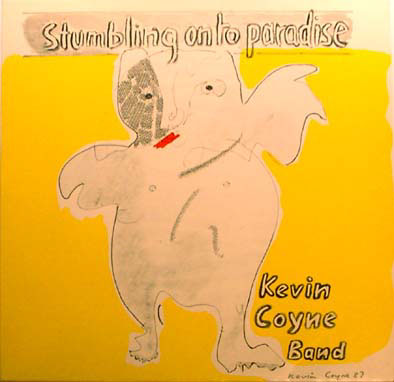
![]()
The first German album, which passed almost unnoticed at the time due to lack of distribution. In retrospect, this isn't such a bad one, it's the next albums that are really poor. Still, the clean break between this and earlier albums, the violent immersion into a sound overworked by neat studio musicians is hard to take for a 'Marjory Razorblade' fan. If 'Tear Me Up' and 'Victoria Smiles' manage to explore new avenues, the rest succumb to some disheartening clichÄs ('Back Home Boogie', 'How Is Your Luck' ).
Kevin Coyne: "You could hear it on the radio quite comfortably without saying 'Well, that's a bit strange'". (1994 interview, from 'Beautiful Extremes, Conversations with Kevin Coyne')
'Everybody's Naked' (1988)
'Romance-Romance' (1990)
'Wild Tiger Love' (1991)
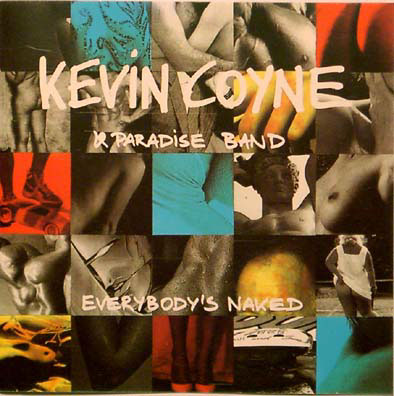
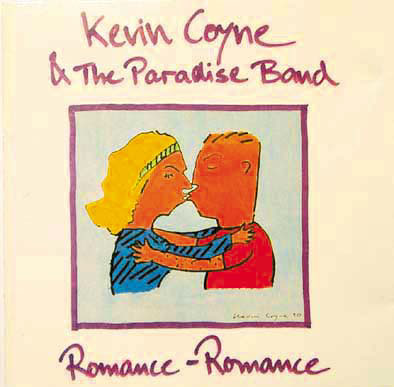
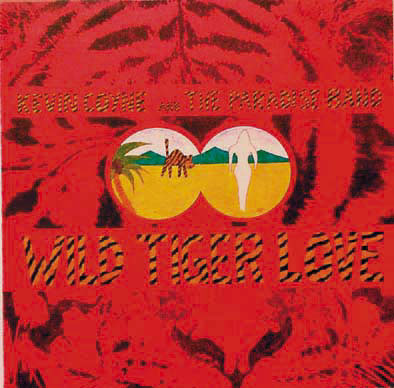
Nothing could be further from earthy Coyne blues and studio improvisation than the meticulous chill of the German musicians who formed the Paradise Band from 1985 to 1992 and recorded 'Everybody's Naked', 'Romance-Romance' and 'Wild Tiger Love'. However, they don't deserve a stoning. Without all those fine people – and particularly his second wife – Kevin would probably have paid with his life.
Depressed and disinterested, he recorded these three poor albums, without much conviction. In contrast to earlier albums, where he controlled the musicians, taking the best of each and 'Coynifying' it, here he was merely strolling.
Super clean, with ordinary music, these discs have next to nothing memorable about them, even if hard-core devotees perhaps find traces of former genius within the syrup or the hard teutonic middle-of-the-road. ('Take Me Back In Your Arms', 'The Bungalow Song'). This was apparently a necessary step in escaping from the abyss.
Kevin Coyne: "It's not one of my favorite ['Everybody's Naked'], I have to say. It's kind of smooth. I think the engineer was as much to with that as anything else. And it lacked a certain roughness, which Pukke did like. He once said to me: 'I hate the blues'. And I thought 'Well, everything you do is rooted in the blues'. Was he was saying was he didn't like anything which was too rough. [╔] I had stopped guitar. The engineer said he couldn't record me singing and playing at the same time (laughs). I had lost a lot of confidence at the time, too. The albums might sound fairly forthright but I was not at my best╔ I was rather doing it for the money." (1996 interview, from 'Beautiful Extremes, Conversations with Kevin Coyne')
"When I went to Germany, I made numerous records, none of which I like to be perfectly honest. I wanted to make consciously happy music, in reaction to the darkness I'd been through. I'd been running from what happened, it took me a long time to come back. But now I've gone full-circle. I'm playing properly again. The last two albums ['Sugar Candy Taxi' and 'Room full of Fools'] are, I think, real Kevin Coyne records." (Independent.co.uk, 2001)
"There was an attempt to 'sweeten' things a little bit. The real Kevin Coyne is something else I think – has a little more edge."
Horst Spandler: "'Wild Tiger Love' is also a tribute to Helmi and in some of the songs he expresses his love for her. Maybe his being in love has taken away some of the edge of his voice here, but it has also taken away quite a bit of his bitterness – which of course made some of his earlier work attractive in a way; but there is nothing wrong with a happier Kevin! By 1991, when Wild Tiger Love was published, he was back on his feet again. I don`t think that by then he was still dependent on the band much; if he hadn`t liked their playing he could have chosen other musicians." (Posted on the Kevin Coyne Group)
'Pretty Park' live in the 90s
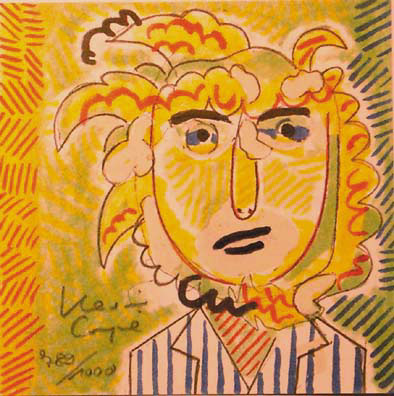 'Burning Head' (1992)
'Burning Head' (1992)
![]()
What a daft idea! Coyne had returned to painting and by the start of the '90s his German exhibitions were going pretty well. So record company Rockport suggested he release his next album as a limited edition of 1,000, including an original artwork with each copy, at a price of.... 350 deutschmarks! Suffice it to say that over ten years later the 1,000 copies are still not sold out (notice to converts: negotiation possible..).
'Burning Head' was a turning point. Most of it is like earlier German efforts, dominated by Hans Pukke and his immaculate production, but Coyne was waking up and penned several songs with his rudimentary guitar accompaniment of old.
'Burning Head' also marked the appearance of Robert Coyne, Kevin's second son, who would soon aid his father's musical reawakening. 'Hope The Devil Don't Come' has a flavour of Springsteen, and 'Totally Naked' is 100% Coyne. He would soon be back!
Kevin Coyne: "That's an album with a drawing. Each album has an individual drawing done by me. It's an edition of 1,000, with a CD, and rather expensive, but the price has gone down now. Which was an idea from the last company, Rockport Records. Yes, the print is the size of the CD; it's a handmade cover. No, the music are not available elsewhere, theoretically, but it slips out on one or two albums. Two of the songs have appeared on other albums, but different mixes."(La Folia 2001)
'Burning Head'
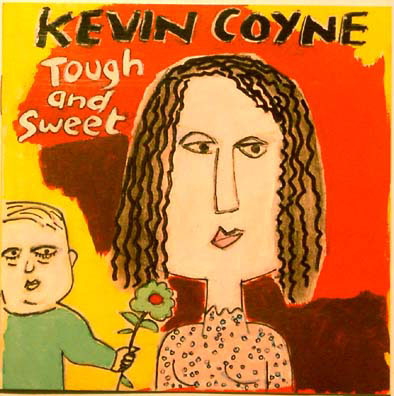 'Tough And Sweet' (1993)
'Tough And Sweet' (1993)
![]()
'Tough And Sweet' confirmed the comeback. With the help of his two sons, Coyne returned to basics. Soulless virtuosity was on the way out, along with impersonal production. Kevin was once more provided with the necessary backing for his improvisations.
Robert's Les Paul sound recalls Bolan. Kevin was back in form. 'Let's Get Romantic', a duo with his older son Eugene, is a joy. Hans Pukke and Henry Beck still provided their compositions, unbalancing the album somewhat, but this kind of fire and ice had become familiar in a Coyne album. Things were back on track: 'Tough And Sweet' already anticipated the excellent 'Sugar Candy Taxi'.
Kevin Coyne: "I wanted to get back to that element of slight madness and eccentricity, the feeling that you can really sing about anything. Hans Pukke did a lot of good work [before that album]. It was unfortunate about him, he wasn't really sacked so much as he sacked himself. He didn't seem to want to go on. But consequently, 'Tough and Sweet' came out, which was not necessarily the sort of album he'd be involved in because he wouldn't have had such a starring role, maybe, in it.
'Totally Naked', that's a nice song. I thought that was a
return to form. I mean, you might say that was lost for 7 or 8 years. There was
an emphasis on band pieces, co-composed, and it was almost forgotten that I'm a
songwriter. I think I lost confidence a bit. Or maybe, I wasn't interested any
more." (1996 interview, from 'Beautiful Extremes, Conversations with Kevin Coyne')
 'Mansion of Dreams' (1993)
'Mansion of Dreams' (1993)
![]()
 'Opera for Syd' (1999)
'Opera for Syd' (1999)
![]()
Invited by jazz musician Achim Goettert to join him and his musicians in these two live projects, Coyne rises to the challenge with an absolutly amazing lyrics improvisation, each song totally different from one show to another. On the 'Opera for Syd', the interaction with performance artist David Moss rises to unheard heights.
Achim Goettert: 'Kevin was one of my favourite rock singers since
the end of the '70s. I met him in Nčrnberg in 1993, because I planned a concert
for the Gostenhofer Jazztage, a jazz-festival in Nčrnberg, which I was leading.
I asked him to join a project with my music and his lyrics, that we called
'Mansion of Dreams'. We had one successful concert in a church, which was
recorded.
One year later, we performed this music in Berlin in a
double concert with the Ute Kannenberg Band. Radio Brandenburg recorded this
night.
After that we were invited to the Jazz festival 'Leipziger
Jazztage' with a new project 'Opera for Syd' in 1999 (MDR recording). We
repeated the concert at the Gostenhofer Jazztage. I released a recording.
For the first concert Kevin arrived from Belgium one or two
hours before the show started. So we had a short rehearsal. Nevertheless the
music developed magically. In 1999, he refused any rehearsal. But the show in
Leipzig was a hit. It was one of my biggest thing. Every musician in my band
was prepared best, my music worked out fine and the stars had a lot of fun
together on stage. Kevin was centre of the 'opera' and told his story about Syd
Barrett. David Moss, as counterpoint, put in the necessary spices to make it a
really avant-garde happening between rock and improvised music. Kevin was a
genious╔
My experiences [with Coyne] were all in all great. He was
kind and open minded to work with the collegues in a most concentrated way. No
star allures were disturbing our work. He was very professional and straight.
On stage he was immediately exploding and capturing the audience. It was a
pleasure and an honour to work with him. It is a pity that we could not repeat
our work. An agent tried some things, but the project was too far out and
between the seats.
We met sometimes in Nčrnberg, sometimes I visited him at home and we had some intensive discussions." (Interview with Uwe Schillhabel, Sep 2009)
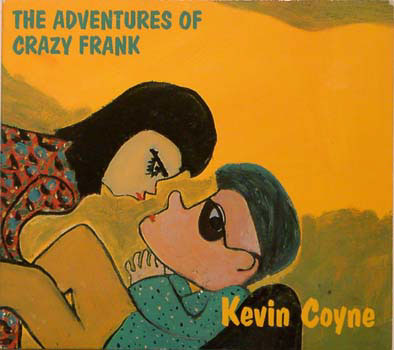 'The Adventures of Crazy Frank' (1995)
'The Adventures of Crazy Frank' (1995)
![]()
Coyne was always fed by English music-hall tradition (for example in the hilarious old songs 'Karate King' or 'Good Boy' as well as in the theatrical flavour of his performances).
'The Adventures Of Crazy Frank' is a complete piece inspired by the life of Frank Randle, the alcoholic English comedian of the '40s and '50s. Coyne, who was attending Alcoholics Anonymous, turned over a page of his past in telling these stories of the DT's and broken marriages, all in good humour.
'Crazy Frank' is a pleasant acoustic album, and ex-Paradise Band bassist Friedl Pohrer reveals himself as a good accompanist, discreet but effective.
Kevin Coyne: "Frank Randall was a music hall artist. He was a drunk driven mad by drink – something I'm familiar with (although I haven't had a drink for 17 years), but also a brilliantly funny knockabout comedian. I admire his tortured, mixed up style, although I'm fully aware how close he was to the edge. I've been there, I understand. I write about life's eccentrics and madness posing as sanity. The two things are closely connected. My art is also closely connected to the music and the writing. The same figure appears; the same situation arise. I try to add humour to much of my work, often putting written comments on the work to guide the viewer. What am I? Cartoonist? Primitive? None of these? I just do it because I have to do it." (Interview by Frank Bangay, 2004, published in Mental Health magazine, Feb 2005)
"Friedl Pohrer gave me a cassette with half a dozen songs on it. He was always under-used in the old days. Pukke always dominated the situation." (1996 interview, from 'Beautiful Extremes, Conversations with Kevin Coyne')